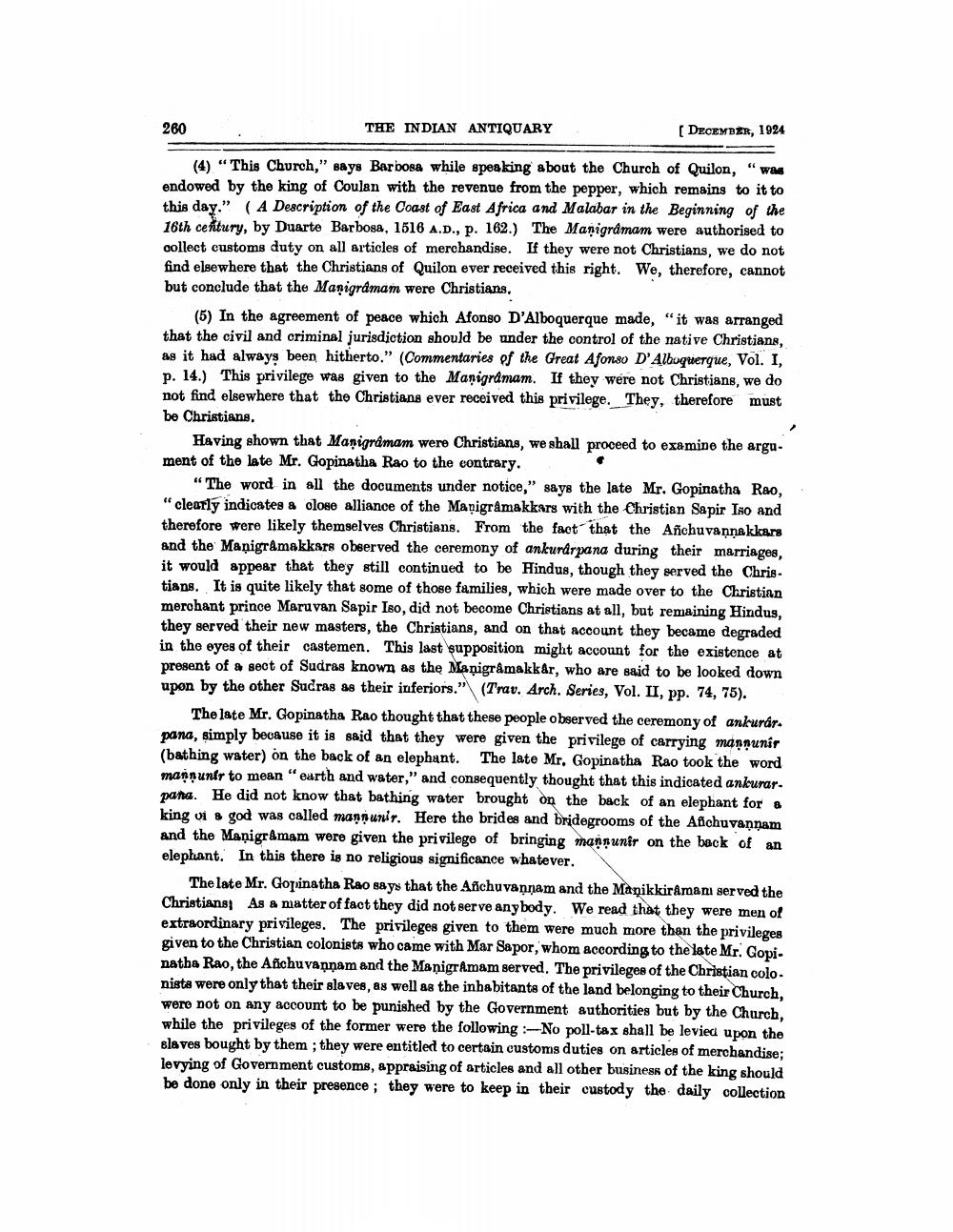________________
260
THE INDIAN ANTIQUARY
(DECEMBER, 1924
(4) “This Church," says Barbosa while speaking about the Church of Quilon," was endowed by the king of Coulan with the revenue from the pepper, which remains to it to this day." (A Description of the Coast of East Africa and Malabar in the Beginning of the 16th century, by Duarte Barbosa, 1516 A.D., p. 162.) The Manigramam were authorised to collect customs duty on all articles of merchandise. If they were not Christians, we do not find elsewhere that the Christians of Quilon ever received this right. We, therefore, cannot but conclude that the Manigramam were Christians,
(5) In the agreement of peace which Afonso D'Alboquerque made,"it was arranged that the civil and criminal jurisdiction should be under the control of the native Christians, as it had always been hitherto." (Commentaries of the Great Afonso D'Albuquerque, Vol. I, p. 14.) This privilege was given to the Manigramam. If they were not Christians, we do not find elsewhere that the Christians ever received this privilege. They, therefore must be Christians.
Having shown that Manigramam were Christians, we shall proceed to examine the argument of the late Mr. Gopinatha Rao to the contrary.
"The word in all the documents under notice," says the late Mr. Gopinatha Rao. "clearly indicates a close alliance of the Manigramakkars with the Christian Sapir Ino and therefore were likely themselves Christians. From the fact that the Anchuvannakkars and the Manigramakkars observed the ceremony of ankurdrpana during their marriages, it would appear that they still continued to be Hindus, though they served the Christians. It is quite likely that some of those families, which were made over to the Christian merohant prince Maruvan Sapir Iso, did not become Christians at all, but remaining Hindus, they served their new masters, the Christians, and on that account they became degraded in the eyes of their castemen. This last supposition might account for the existence at present of a set of Sudras known as the Manigramakkar, who are said to be looked down upon by the other Sudras as their inferiors." (Trav. Arch. Series, Vol. II, pp. 74, 75).
The late Mr. Gopinatha Rao thought that these people observed the ceremony of ankurát. pana, simply because it is said that they were given the privilege of carrying mannunir (bathing water) on the back of an elephant. The late Mr. Gopinatha Rao took the word mannunir to mean "earth and water," and consequently thought that this indicated ankurar. pana. He did not know that bathing water brought on the back of an elephant for & king is god was called mann un'r. Here the brides and bridegrooms of the Afichuvannam and the Manigramam were given the privilege of bringing mannunir on the back of an elephant. In this there is no religious significance whatever.
The late Mr. Gopinatha Rao says that the Añchuvannam and the ManikkirAmani served the Christians) As a matter of fact they did not serve anybody. We read that they were men of extraordinary privileges. The privileges given to them were much more than the privileges given to the Christian colonists who came with Mar Sapor, whom according to the late Mr. Gopi. natha Rao, the Afichuvannam and the Manigramam served. The privileges of the Christian colo. nista were only that their slaves, as well as the inhabitants of the land belonging to their Church, were not on any account to be punished by the Government authorities but by the Church, while the privileges of the former were the following -No poll-tax shall be levied upon the Blaves bought by them; they were entitled to certain customs duties on articles of merchandise; levying of Government customs, appraising of articles and all other business of the king should be done only in their presence; they were to keep in their custody the daily collection




